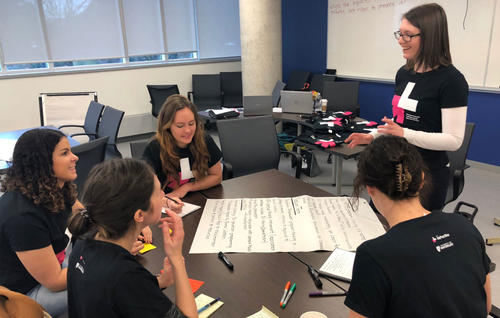
HeForShe Ideathon works to end gender-based violence on campus
HeForShe inspired event allows students, staff and faculty to brainstorm ideas toward a safer campus community.

HeForShe inspired event allows students, staff and faculty to brainstorm ideas toward a safer campus community.
By Sabrina Khandakar University Relations
Staff, students and faculty members at the University of Waterloo are working together to end gender-based violence on campus. Inspired by UN’s HeForShe Movement, the HeForShe Ideathon hopes to collectively brainstorm ways to create a positive campus culture, where the impacts of sexual violence are understood and innovative solutions are created to prevent future incidents from happening.
A popular idea came in the form of an app, where students could anonymously “check-in” to areas around campus, flagging spots where uncomfortable or violent situations had occurred. The hope is to bring these potentially problematic areas to the attention of campus officials.
“Immediately [the sender] would be connected with resources like the Sexual Violence Coordinator at the University of Waterloo or the Sexual Assault Support Centre,” said participant Heather Elliott, a registered nurse and second-year Master of Public Health Student. “We thought it would be a great way to increase awareness about the problems on campus and what you can do to get help if needed.”
Lead organizer of the event and the University of Waterloo’s Sexual Violence Response Coordinator Amanda Cook says she was blown away by the effectiveness of the collaborative session, and feels students are the best source for on-campus solutions.
“This is an issue that touches all of us, maybe not directly, but certainly indirectly in a lot of different ways,” said Cook. “I look forward to having those ideas generated by the students themselves, letting me know what they want to hear about and how they want to hear about it as well.”
While the event seeks solutions to ending gender-based violence, it also hopes to empower participants to feel like they’re in control of a creating a brighter and safer future.
“I’m a part of a community that is moving towards gender equity,” said participant Tylynne Pichie, a second-year psychology student. “It’s important to work with other students to build a safer community and feel safe on campus myself.”

Read more
How Doug Kavanagh’s software engineering degree laid the foundation for a thriving career in patient care

Read more
Upside Robotics secures new funding to accelerate the future of sustainable farming

Read more
Discover the meticulous work that uncovered Black stories on campus and preserved them for the future
The University of Waterloo acknowledges that much of our work takes place on the traditional territory of the Neutral, Anishinaabeg, and Haudenosaunee peoples. Our main campus is situated on the Haldimand Tract, the land granted to the Six Nations that includes six miles on each side of the Grand River. Our active work toward reconciliation takes place across our campuses through research, learning, teaching, and community building, and is co-ordinated within the Office of Indigenous Relations.